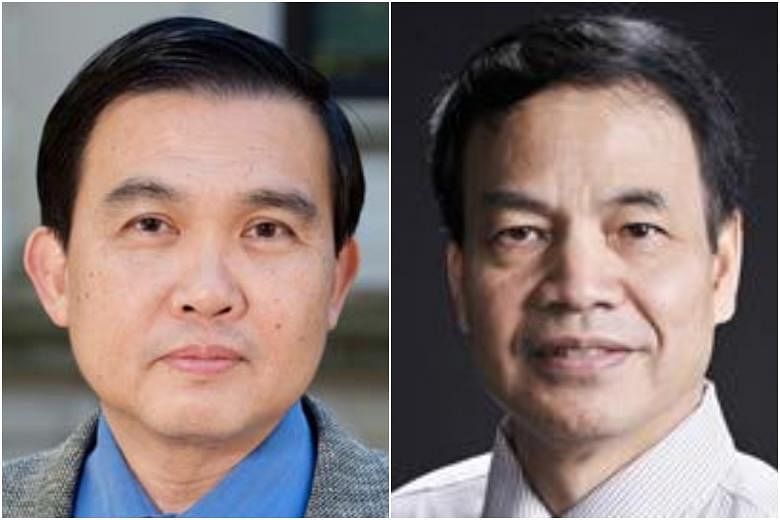FAYETTEVILLE, ARKANSAS (NYTIMES) - The US Justice Department accused a professor in Arkansas on Monday (May 11) of improperly accepting funds from the Chinese government and has accepted a guilty plea in a similar case, the latest examples of the department's effort to combat China's influence in American academia.
One of the professors, Simon Ang of the University of Arkansas, was arrested last Friday and charged on Monday with wire fraud.
He worked for and received funding from Chinese companies and from the Thousand Talents programme, which awards grants to scientists to encourage relationships with the Chinese government, and he warned an associate to keep his affiliation with the programme quiet, court papers said.
He kept the financial arrangements secret, allowing him to secure other grants from US government agencies, including Nasa, that the Chinese funding made him ineligible for, according to court documents.
The other professor, Dr. Xiao-Jiang Li, a former professor at Emory University in Atlanta, pleaded guilty last Friday to a felony charge of filing a false tax return that omitted about US$500,000 (S$709,000) that he received from the Thousand Talents programme. He was sentenced to 1 year of probation and ordered to pay US$35,089 in restitution.
The Justice Department's efforts to limit Chinese influence at US universities are part of the Trump administration's hard line on China. While Americans may think of academic interests as separate from business or the military, the Chinese government has used them all as levers in its quest for global influence.
"The Department of Justice remains vigilant over programmes such as the Thousand Talents program that recruits professors and researchers to work for China," Mr John C. Demers, the head of the department's national security division, said in a statement.
China has ramped up its use of such grants to recruit professors and researchers who have direct access to scientific information, and sometimes even security clearances, to work with Chinese scientists.
In response, the FBI and the National Institutes of Health recently began to scour colleges and universities for academics who had become a de facto intelligence-gathering apparatus for China.
Earlier this year, the department charged Charles M. Lieber, the chairman of Harvard's chemistry department, with lying about his financial ties to the Chinese government and failing to disclose his participation in the Thousand Talents programme.
The Education Department said it was investigating Harvard and Yale for failure to disclose at least US$375 million in funding from China, Russia, Iran and other American adversaries.
Last year, the FBI also arrested a researcher named Zaosong Zheng, whose visa had been sponsored by Harvard, accusing him of preparing to smuggle cancer cells from the United States to China for research.
Li, 63, joined the Thousand Talents programme in late 2011 while teaching at Emory, prosecutors said. As part of the programme, he was given at least US$500,000 that he failed to report to the IRS while he studied Huntington's disease and worked at the Chinese Academy of Sciences and at Jinan University conducting similar research, according to the Justice Department.
The National Institutes of Health learned that Li had left foreign research activity off his grant applications, prompting the investigation and criminal charges.
Ang, 63, was the director of the University of Arkansas' High Density Electronics Centre, which was founded with Defence Department funds. The centre made technology for use in the International Space Station, Ang said in an interview with an electrical engineering trade publication.
Writing last June to a researcher from Xidian University in China who planned to travel to the University of Arkansas, Ang cautioned the associate to stay silent on his involvement in the Thousand Talents programme.
"Not many people here know I am one of them but if this leaks out, my job here will be in deep troubles," he wrote.
He ended the correspondence with another warning: "After you read this e-mail, please delete for safety sake as any e-mail can be retrieved."
Ang was also agitated that the researcher had written to his personal e-mail account and copied his university address.
"The university now knows" about the personal accounts, he wrote. A university librarian found a hard drive that contained the e-mail, according to the criminal complaint.
Ang's lawyer, Mr Drew Ledbetter, did not respond to a request for comment.
Ang, who was born in Malaysia, earned his bachelor's degree from the University of Arkansas and his doctorate from Southern Methodist University before working at Texas Instruments. He returned to his alma mater in 1988 to teach in the electrical engineering department.
Ang also worked to obtain more than US$5 million in grants from the US government over the past seven years, according to a court filing. But he did not tell the University of Arkansas that he did work for Chinese universities and electronics technology companies, in violation of school policy.
Ang's work also involved power grid security research, said Professor Todd Shields, a dean at Arkansas. He said the university was asked a few months ago to give the federal government information about faculty travel to China but did not know which agency made the request.

